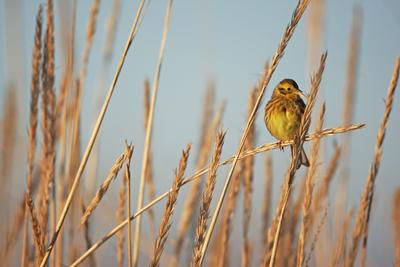Special wildlife scheme beats organic at boosting birds

Threatened farmland birds are likely to survive the winter better on conventional farms with specially designed wildlife habitats than on organic farms without – according to a new study from the University of Southampton.
Winter farmland bird populations compared across three different wildlife schemes showed the ‘Conservation Grade' approach, that aims to grow crops efficiently while requiring farmers to establish and manage specific habitats for wildlife, produced higher survival rates than the organic sites.
The researcher, Dominic Harrison from Engineering and the Environment, said the greatest numbers of chaffinches, skylarks, yellowhammers and lapwings were recorded on Conservation Grade farms. "A strong link was found between the number of specially-designed habitats created and the richness of bird species found," he explains.
"This indicates that the deciding factor is not the method of farming, as organic farms don't provide significant benefits to overwintering birds. Instead, farm-scale management specifically designed to be beneficial to wildlife can have positive farm-scale effects."
Darren Moorcroft, Head of Conservation Delivery at the RSPB agrees that the best results in sustaining farmland bird populations are to be gained from a targeted approach. "There's no doubt the more specific the approach, the better the results," he said.
Brin Hughes of Conservation Grade says it's important for farmers have clear biodiversity aims before they start. "Organic production doesn't specifically focus on achieving results in terms of biodiversity improvement," he explains. "We've designed Conservation Grade to deliver biodiversity ‘yields' in the same way that farmers aim to optimise the yields of any crop.
Notes for editors
Notes to editors:
1. Dominic Harrison's paper can be downloaded from: www.southampton.ac.uk/engineering/research/projects/conservation_farming.page?#publications;
It was researched independently and funded by the Vitacress Foundation Trust and Conservation Grade.
Conservation Grade is an independent accreditation organisation that facilitates commercial relationships between farmers and consumers on an area rapidly approaching 100,000 acres in the UK through a system of agriculture that optimises both crop yields and biodiversity conservation. Conservation Grade has developed a truly unique system of sustainable farming, founded on science and commercial viability. It is internationally recognised by The Economics of Ecosystems and Biodiversity (TEEB) study, as well as Natural England and leading NGOs such as the RSPB, for its significant contribution to the conservation of biodiversity through the commercial marketplace. Foods grown under the protocol are marketed as ‘Fair to Nature'. www.conservationgrade.org
2. The University of Southampton is a leading UK teaching and research institution with a global reputation for leading-edge research and scholarship across a wide range of subjects in engineering, science, social sciences, health and humanities.
With over 23,000 students, around 5,000 staff, and an annual turnover well in excess of £435 million, the University of Southampton is acknowledged as one of the country's top institutions for engineering, computer science and medicine. We combine academic excellence with an innovative and entrepreneurial approach to research, supporting a culture that engages and challenges students and staff in their pursuit of learning.
The University is also home to a number of world-leading research centres including the Institute of Sound and Vibration Research, the Optoelectronics Research Centre, the Institute for Life Sciences, the Web Science Trust and Doctoral training Centre, the Centre for the Developmental Origins of Health and Disease, the Southampton Statistical Sciences Research Institute and is a partner of the National Oceanography Centre at the Southampton waterfront campus.
For further information:
Glenn Harris, Media Relations, University of Southampton, Tel 023 8059 3212, email G.Harris@soton.ac.uk
Follow me on twitter: https://twitter.com/@glennh75
Follow us on twitter: http://twitter.com/unisouthampton
Like us on Facebook: www.facebook.com/unisouthampton